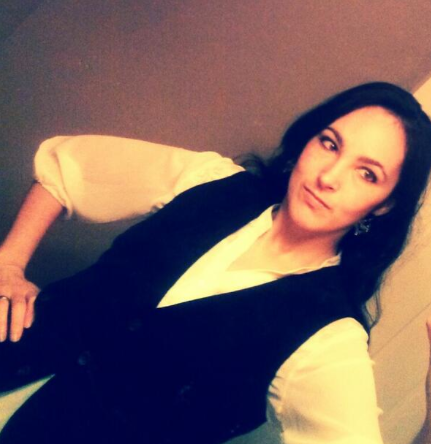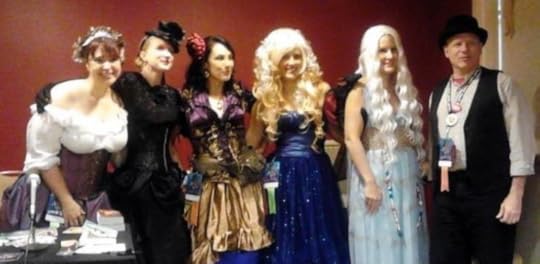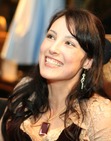On costumes and that time someone thought I was a hooker.
Today, I dressed like Han Solo.
And you know what? I got sh*t done.

And that got me thinking.
See, one of my biggest personal dilemmas is, on the surface, a small one.
How do I dress for professional events?
On one hand, I want to be seen as a professional. I wish to project confidence, effectiveness, and assertiveness. I don't want to scare anyone away. I wouldn't want anyone to look at me and think, "That woman is as crazy as a bag of cats and probably can't hit deadlines." I am capable of writing in many genres and turning commissioned products around quickly, so I hope to look like I can handle anything and not pigeonhole myself into one area. I want to be respected for my work and also approachable to fans, colleagues, editors, and potential collaborators.
On the other hand, let's face it: I write steampunk vampire sexytimes books, books for young adults, and comics. I'm an avowed geek who can't help jumping up and down over my favorite books, movies, comics, and music. I love going to events and seeing friends and having fun. Although I'm very serious about my work and career, I'm not very serious about anything else.
And you know what? I love costumes.I always have.
And that's why I torture myself whenever I pack for an event.
Because I want to wear my costumes.
But I don't want to be punished for it.
Sometimes, I wear bright and tasteful versions of Victorian or steampunk attire with corsets, bustles, and skirts. They make me feel pretty and powerful and charismatic. Sometimes, I do one-offs, like my hipster Wonder Woman, gender-flipped Han Solo, or subtle Marceline the Vampire Queen. I am naturally introverted, so having a conversation starter is a big boon to me. It can also feel like putting on a persona, which gives me the strength to approach strangers, to smile bigger and invite interaction. And the costumes also give reticent readers a reason to approach me, because they always have something to talk about. Another bonus to dressing up is that it gives my fans a reason to dress up, too. My book launch parties are marvelous fun because people feel like they can be free to wear costumes, put on masks, and generally act weird in a publicly acceptable way.
And I love that!
But then, we get situations that look like this:

That's my first panel at Dragoncon last year, a roundtable of authors speaking on Pulp for the Alt History track. I was the only woman. There were four dudes scheduled, but seven showed up. And I was the only panelist in costume. As a woman, did that make me look silly or frivolous? Did my fellow panelists take me seriously? Did the audience look at me and look at them and decide that perhaps my work wasn't as legitimate or my voice wasn't as knowledgable? Did my costume give several of these dudes an extra incentive to try and talk over me-- emphasis on try? Which, yeah, they did.
Because gender issues as an author are unavoidable, and women have to be pretty tenacious to be heard on panels like this one. But of course, that opens another can of worms. What am I *supposed* to wear? Do I wear a geeky t-shirt and jeans? Because for most guys at a comic con, that's considered normal, but for a woman, it can be deemed sloppy. Do I wear business casual and feel fake and stuffy? Or do I wear a cute dress and run the risk of being propositioned for sex?
That's right. Someone at Dragoncon thought I was a HOOKER . Here's the outfit I was wearing at the time:

Yeah, I don't think Atlanta prostitutes spend that much on Polo dresses, handmade corsetry, and Sechelles heels.
So then I put on my favorite NERD shirt, and two different guys stopped me and told me that I wasn't, in fact, a nerd. Because I don't apparently don't look like a nerd.

So that's why I sometimes think it's best not to dress up or do anything geeky or interesting or fun at all. That I need to blend. To avoid standing out. Because it feels like no matter what I do, *someone* is going to say *something* that makes me feel like crap.
On the other hand, sometimes I dress up, and everyone dresses up, and we all have a marvelous time and feel fun and beautiful and clever and fantastically weird. Like at Princess Alethea's Traveling Sideshow hosted by author Alethea Kontis, also at last Dragoncon:

Same outfit as the first panel photo… but I look like I belong!
We were dressed up, the audience was dressed up, we threw candy at people and read from our books and performed. The room was lively and good-natured and not at all stiff and silent, as so many panels are. As if, once the doors closed, people could feel free to be themselves. Basically, when everyone dresses up, costumes are considered the norm. It's almost like, for that time, costumes are not actually costumes. They're just clothes. And being weird is totally normal, too.
Wouldn't that be a brilliant system?
I think it's very easy to forget that whatever you wear? Is your costume. If you wear a polo shirt and jeans every day, that's your costume. If you wear skirts and cardigans every day, that's your costume. If you wear full Victorian garb like my dear friend Leanna Renee Hieber or beautiful, sparkly corsets like Alethea Kontis, that's your costume.
I made a New Year's Resolution that I wanted to be more myself this year, to be as weird as I want to be and dress as strangely as I like. And so far, I have. The big test will come when I'm packing for RT NOLA and Phoenix Comicon.
Honestly, I'm not sure what I'm going to wear, then.
Does anyone else fight this fight? Do you feel like you wear your true costume-- or one of many costumes that express who you are? Do you have to hide your true self behind clothes you don't love to please other people or help your career?
I'd love to see more dialog on this topic from writers and readers regarding how an author's appearance affects your feelings toward their work, their thoughts, and what they have to say as a public speaker.
Will you share?
***
ADDENDUM
Y'all, I owe a big apology to two good friends of mine, James R. Tuck and John Hartness. They're both in that pic of the one-costumed-woman-and-seven-dudes panel at Dragoncon, but I failed to mention that they are true gentlemen who would put a smack down on anybody who spoke down to me, tried to hurt me, or otherwise was rude to me in any way. When I chose that picture, I was serving my own needs in showing an obvious image of the sort of challenges I feel I fight as a female author, but I neglected to serve the needs of men who stand for women like me, who believe that our voices are equally important. I'm 100% certain that they both offered me their chair just before the photo was taken, and as I was the last one to the panel, I didn't take it. I wasn't put on the end; I ended up there of my own volition.
When we talk about the problems of feminism in publishing, it can be easy to holler only about the negatives and just let the positives and victories go without saying. Having friends like Hartness and Tuck who would never treat a woman as anything less than an equal is one of the major victories, and I admire them and appreciate them both so much.
I'm sorry for not making that clear the first time, y'all. Thank you for always being there for me-- and all of us.
SECOND ADDENDUM John Hartness is right next to me, and his books are here.James R. Tuck is furthest away from me, and his books are here, and I get tattoos at his shop Forever Inked because it's awesome. Next time, I suspect he'll inflict even more hurtin' on me than that scarred tramp stamp cover up over my spine, which he didn't actually do, but which I yelled at him for, anyway.
And you know what? I got sh*t done.

And that got me thinking.
See, one of my biggest personal dilemmas is, on the surface, a small one.
How do I dress for professional events?
On one hand, I want to be seen as a professional. I wish to project confidence, effectiveness, and assertiveness. I don't want to scare anyone away. I wouldn't want anyone to look at me and think, "That woman is as crazy as a bag of cats and probably can't hit deadlines." I am capable of writing in many genres and turning commissioned products around quickly, so I hope to look like I can handle anything and not pigeonhole myself into one area. I want to be respected for my work and also approachable to fans, colleagues, editors, and potential collaborators.
On the other hand, let's face it: I write steampunk vampire sexytimes books, books for young adults, and comics. I'm an avowed geek who can't help jumping up and down over my favorite books, movies, comics, and music. I love going to events and seeing friends and having fun. Although I'm very serious about my work and career, I'm not very serious about anything else.
And you know what? I love costumes.I always have.
And that's why I torture myself whenever I pack for an event.
Because I want to wear my costumes.
But I don't want to be punished for it.
Sometimes, I wear bright and tasteful versions of Victorian or steampunk attire with corsets, bustles, and skirts. They make me feel pretty and powerful and charismatic. Sometimes, I do one-offs, like my hipster Wonder Woman, gender-flipped Han Solo, or subtle Marceline the Vampire Queen. I am naturally introverted, so having a conversation starter is a big boon to me. It can also feel like putting on a persona, which gives me the strength to approach strangers, to smile bigger and invite interaction. And the costumes also give reticent readers a reason to approach me, because they always have something to talk about. Another bonus to dressing up is that it gives my fans a reason to dress up, too. My book launch parties are marvelous fun because people feel like they can be free to wear costumes, put on masks, and generally act weird in a publicly acceptable way.
And I love that!
But then, we get situations that look like this:

That's my first panel at Dragoncon last year, a roundtable of authors speaking on Pulp for the Alt History track. I was the only woman. There were four dudes scheduled, but seven showed up. And I was the only panelist in costume. As a woman, did that make me look silly or frivolous? Did my fellow panelists take me seriously? Did the audience look at me and look at them and decide that perhaps my work wasn't as legitimate or my voice wasn't as knowledgable? Did my costume give several of these dudes an extra incentive to try and talk over me-- emphasis on try? Which, yeah, they did.
Because gender issues as an author are unavoidable, and women have to be pretty tenacious to be heard on panels like this one. But of course, that opens another can of worms. What am I *supposed* to wear? Do I wear a geeky t-shirt and jeans? Because for most guys at a comic con, that's considered normal, but for a woman, it can be deemed sloppy. Do I wear business casual and feel fake and stuffy? Or do I wear a cute dress and run the risk of being propositioned for sex?
That's right. Someone at Dragoncon thought I was a HOOKER . Here's the outfit I was wearing at the time:

Yeah, I don't think Atlanta prostitutes spend that much on Polo dresses, handmade corsetry, and Sechelles heels.
So then I put on my favorite NERD shirt, and two different guys stopped me and told me that I wasn't, in fact, a nerd. Because I don't apparently don't look like a nerd.

So that's why I sometimes think it's best not to dress up or do anything geeky or interesting or fun at all. That I need to blend. To avoid standing out. Because it feels like no matter what I do, *someone* is going to say *something* that makes me feel like crap.
On the other hand, sometimes I dress up, and everyone dresses up, and we all have a marvelous time and feel fun and beautiful and clever and fantastically weird. Like at Princess Alethea's Traveling Sideshow hosted by author Alethea Kontis, also at last Dragoncon:

Same outfit as the first panel photo… but I look like I belong!
We were dressed up, the audience was dressed up, we threw candy at people and read from our books and performed. The room was lively and good-natured and not at all stiff and silent, as so many panels are. As if, once the doors closed, people could feel free to be themselves. Basically, when everyone dresses up, costumes are considered the norm. It's almost like, for that time, costumes are not actually costumes. They're just clothes. And being weird is totally normal, too.
Wouldn't that be a brilliant system?
I think it's very easy to forget that whatever you wear? Is your costume. If you wear a polo shirt and jeans every day, that's your costume. If you wear skirts and cardigans every day, that's your costume. If you wear full Victorian garb like my dear friend Leanna Renee Hieber or beautiful, sparkly corsets like Alethea Kontis, that's your costume.
I made a New Year's Resolution that I wanted to be more myself this year, to be as weird as I want to be and dress as strangely as I like. And so far, I have. The big test will come when I'm packing for RT NOLA and Phoenix Comicon.
Honestly, I'm not sure what I'm going to wear, then.
Does anyone else fight this fight? Do you feel like you wear your true costume-- or one of many costumes that express who you are? Do you have to hide your true self behind clothes you don't love to please other people or help your career?
I'd love to see more dialog on this topic from writers and readers regarding how an author's appearance affects your feelings toward their work, their thoughts, and what they have to say as a public speaker.
Will you share?
***
ADDENDUM
Y'all, I owe a big apology to two good friends of mine, James R. Tuck and John Hartness. They're both in that pic of the one-costumed-woman-and-seven-dudes panel at Dragoncon, but I failed to mention that they are true gentlemen who would put a smack down on anybody who spoke down to me, tried to hurt me, or otherwise was rude to me in any way. When I chose that picture, I was serving my own needs in showing an obvious image of the sort of challenges I feel I fight as a female author, but I neglected to serve the needs of men who stand for women like me, who believe that our voices are equally important. I'm 100% certain that they both offered me their chair just before the photo was taken, and as I was the last one to the panel, I didn't take it. I wasn't put on the end; I ended up there of my own volition.
When we talk about the problems of feminism in publishing, it can be easy to holler only about the negatives and just let the positives and victories go without saying. Having friends like Hartness and Tuck who would never treat a woman as anything less than an equal is one of the major victories, and I admire them and appreciate them both so much.
I'm sorry for not making that clear the first time, y'all. Thank you for always being there for me-- and all of us.
SECOND ADDENDUM John Hartness is right next to me, and his books are here.James R. Tuck is furthest away from me, and his books are here, and I get tattoos at his shop Forever Inked because it's awesome. Next time, I suspect he'll inflict even more hurtin' on me than that scarred tramp stamp cover up over my spine, which he didn't actually do, but which I yelled at him for, anyway.
Published on January 10, 2014 13:31
No comments have been added yet.



